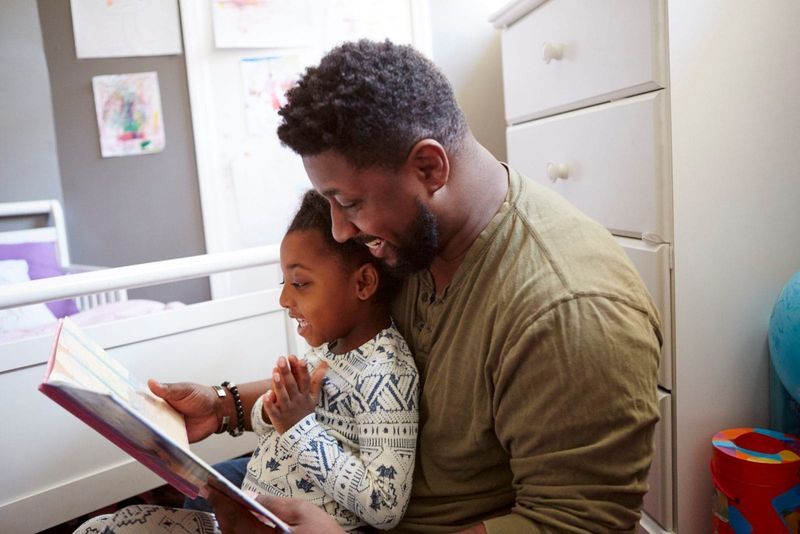20 Ways Fathers Teach Their Children About True Values
Fathers don’t always teach through speeches or lectures. More often, they lead by example—through small, everyday moments that leave a lifelong impact.
Whether it’s through hard work, quiet strength, or a perfectly timed dad-joke, a good father shapes his children’s sense of right, wrong, and what really matters.
Here are 20 powerful ways fathers teach their children about true values—sometimes without even saying a word.
1. By showing up—consistently.

Presence is one of the greatest forms of love. Kids notice who’s there. Fathers who show up for their children consistently create a foundation of security and stability. It’s the small moments—like attending a school play or being there to hear about their day—that build the strongest bonds. These are the memories that children carry forward, understanding that being present matters more than words.
A father’s consistent presence becomes the bedrock of trust and reliability. Even when life gets busy, making the effort to be there shows children they are valued beyond measure. The simple act of showing up speaks volumes about love and commitment.
Being present is an ongoing commitment, and it doesn’t have to be grand. Even the quiet moments of just being together can leave the loudest impressions. The message? You matter, and I am here.
2. By speaking the truth, even when it’s hard.

Honesty, though difficult, lays the foundation for trust and integrity. When fathers candidly share truths, even when uncomfortable, they model authenticity. It’s not about sugar-coating but about treating children with respect, acknowledging their ability to understand complex situations.
A father’s commitment to truth-telling, even in difficult times, fosters an environment where children feel safe to express themselves without fear of judgment. This openness encourages kids to approach life with a clear understanding of honesty’s importance.
By speaking the truth, fathers teach children to value transparency and build their own moral compasses. The courage to be truthful, even when inconvenient, is a lesson children learn through example, understanding that truthfulness is the core of lasting relationships.
3. By owning his mistakes.

A dad who can say, “I was wrong,” teaches humility, accountability, and emotional courage. Embracing mistakes rather than hiding them shows children that errors are a natural part of life. It’s not about perfection but about growth and learning.
Owning mistakes demonstrates a strength that resonates. Fathers who model this behavior encourage children to approach their own failures with resilience and openness. It’s a powerful way to instill confidence, knowing that everyone stumbles, but what matters is how we rise.
The lesson? Mistakes aren’t the end; they’re stepping stones to improvement. By acknowledging errors, fathers inspire their children to embrace vulnerability and learn from every experience.
4. By respecting others—especially in how he treats their mother.

Kindness, equality, and love are modeled in every interaction. When fathers treat their children’s mother with respect, it sets a powerful example of interpersonal relationships.
Children observe these interactions closely, learning about empathy, cooperation, and the importance of treating others with dignity. The respect between parents becomes a blueprint for future relationships that children will carry into adulthood.
Through everyday gestures, fathers show that partnerships are about mutual support and understanding. The way a father speaks, listens, and engages with their mother demonstrates values that go beyond words, embedding respect deeply in the family fabric.
5. By working hard without needing recognition.

The value of effort, responsibility, and quiet dedication is a lesson often unspoken. Fathers who work tirelessly without seeking applause teach their children about commitment and discipline.
Children learn that true fulfillment comes from within, driven not by accolades but by personal standards and the satisfaction of a job well done. The silent dedication a father displays speaks to the essence of integrity and purpose.
Hard work becomes a testament to the values of perseverance and self-motivation. Fathers model that the real rewards lie in the journey, not the recognition. This understanding shapes a child’s approach to their endeavors, instilling a deep respect for earnest effort.
6. By encouraging curiosity—not just answers.

“Let’s figure it out together” fosters a love of learning and self-discovery. Fathers who embrace curiosity over mere answers ignite a spark in their children to question the world around them.
Exploring questions together creates a shared journey of discovery. It’s about fostering a mindset that values inquiry and creativity. Fathers who encourage curiosity help children understand that knowledge is a continuous adventure.
By showing that it’s okay not to have all the answers, fathers inspire children to keep searching and learning. This approach transforms curiosity into a lifelong passion, empowering kids to explore, innovate, and grow.
7. By teaching the difference between strength and aggression.

True strength is gentle. Real men don’t need to overpower to lead. Fathers who distinguish between strength and aggression teach profound lessons about compassion and respect.
In moments of conflict, a father’s calm approach demonstrates that true power lies in understanding and patience rather than force. Children see that leadership is about empathy and making others feel heard, not intimidated.
This lesson in balance equips children with emotional intelligence, helping them navigate challenges with grace. Fathers show that strength is about building others up, not breaking them down, setting a powerful example for future interactions.
8. By expressing love openly.

Hugs, “I love yous,” and goofy affection show kids it’s okay to feel—and to say it. Fathers who express love openly break down barriers and invite emotional connection.
By demonstrating affection, fathers teach children that emotions are to be celebrated, not hidden. This openness builds a foundation of security and belonging, encouraging kids to express themselves freely.
Love is shown in many forms, from simple gestures to words of affirmation. Fathers who model this emotional honesty help children understand the importance of expressing feelings, fostering deeper connections and a sense of self-worth.
9. By staying calm in conflict.

Emotional regulation is more powerful than rage. Fathers who remain calm in conflict teach their children about the strength of composure and the value of thoughtful responses.
By handling disagreements with patience and understanding, fathers model how to approach problems without losing control. Children learn that staying calm allows for clearer communication and resolution.
This approach fosters an environment where children feel safe to express their own perspectives without fear. Fathers who exemplify calmness in conflict instill confidence in their children to navigate difficult situations with grace and maturity.
10. By being mindful with money.

Value isn’t in things—it’s in how you treat people and handle resources. Fathers who are mindful with money teach their children about prudence and responsibility.
Demonstrating financial awareness, fathers show that managing resources wisely is crucial for security and freedom. Children learn the importance of budgeting, saving, and making informed decisions.
By discussing finances openly, fathers empower children to make responsible choices. This understanding of money’s true value fosters a sense of independence and maturity, preparing them for future financial responsibilities.
11. By keeping his promises.

From big commitments to small plans, he shows that your word matters. Fathers who keep their promises teach children about reliability and trustworthiness.
Fulfilling promises, whether it’s a promised outing or a life lesson, builds a foundation of trust. Children learn the importance of following through and the impact it has on relationships.
By being dependable, fathers instill a sense of security in their children. This commitment to integrity shapes a child’s understanding of the value of trust, encouraging them to honor their own commitments.
12. By standing up for what’s right—even when it’s unpopular.

Courage is doing the right thing when no one’s clapping. Fathers who stand up for what’s right, even when unpopular, teach their children about integrity and moral courage.
By taking a stand, fathers show that principles are worth defending, inspiring children to act according to their beliefs. This unwavering commitment to justice encourages children to develop their own sense of right and wrong.
The lesson of standing firm in the face of adversity equips children with the confidence to advocate for themselves and others. Fathers instill the understanding that true strength lies in conviction, not consensus.
13. By listening without interrupting.

Every voice deserves respect—even the smallest ones. Fathers who listen without interrupting teach their children the value of presence and empathy.
By giving full attention, fathers show that listening is more than hearing—it’s understanding. This approach fosters a sense of respect and importance, encouraging children to share their thoughts freely.
The act of listening attentively helps children feel valued and heard. Fathers model the importance of patience and consideration, nurturing a child’s confidence to express themselves without fear of dismissal.
14. By offering forgiveness and grace.

Not every mistake needs a punishment. Some need compassion. Fathers who offer forgiveness and grace teach their children about empathy and understanding.
By choosing compassion over criticism, fathers demonstrate the healing power of forgiveness. Children learn that mistakes are part of life and that understanding is more valuable than judgment.
This approach fosters a forgiving and kind-hearted environment, encouraging children to be gentle with themselves and others. Fathers show that grace is a gift, one that strengthens relationships and nurtures growth.
15. By being a lifelong learner.

A dad who reads, grows, and admits what he doesn’t know teaches the value of evolving. Fathers who embrace learning inspire their children to remain curious and open-minded.
By continuously seeking knowledge, fathers model the importance of growth and adaptability in an ever-changing world. This passion for learning becomes a shared journey, encouraging children to explore new ideas.
Being a lifelong learner tells children that it’s okay not to have all the answers, but striving to learn is what truly matters. Fathers instill a love for education and personal development that resonates throughout a child’s life.
16. By prioritizing people over perfection.

He teaches that relationships matter more than resumes or report cards. Fathers who prioritize people over perfection emphasize the importance of connection and empathy.
In moments of imperfection, fathers show that love and understanding triumph over achievement. Children learn that their worth isn’t defined by grades or accolades but by the quality of their relationships.
By valuing people over perfection, fathers encourage children to embrace their authentic selves. This lesson nurtures a sense of belonging and self-worth, emphasizing that life’s true rewards are found in the bonds we build.
17. By showing patience.

Especially when teaching, helping, or answering the same question for the 100th time. Fathers who show patience teach the value of perseverance and understanding.
Patience allows children to explore and learn at their own pace, fostering a sense of confidence and security. Fathers who model this virtue show that time and effort are key to growth.
The act of being patient demonstrates that mistakes are part of learning, and success comes with persistence. By being a steady guide, fathers empower children to tackle challenges with resilience and encouragement.
18. By setting boundaries with kindness.

Love isn’t letting kids do everything—it’s guiding them with intention and care. Fathers who set boundaries with kindness teach their children about respect and responsibility.
Boundaries are not about control but about providing a framework for growth. By explaining and enforcing boundaries with empathy, fathers create a safe environment for children to thrive.
The lesson in boundaries helps children understand the importance of limits and self-discipline. Fathers who model this approach teach that caring for others involves guiding them with wisdom and compassion.
19. By taking responsibility without blaming others.

Maturity is about ownership, not excuses. Fathers who take responsibility without blaming others teach their children about integrity and accountability.
By owning their actions, fathers model a behavior that encourages self-reflection and honesty. Children learn that true strength lies in admitting faults and working towards improvement.
The lesson in responsibility fosters a sense of reliability and trust. Fathers who demonstrate this trait instill a profound understanding of the importance of accountability in building character and relationships.
20. By loving his children for who they are, not who he wants them to be.

That unconditional acceptance? That’s what shapes identity, confidence, and lifelong self-worth. Fathers who love their children for who they are teach the power of acceptance and self-love.
By embracing their children’s unique qualities, fathers foster an environment where individuality is celebrated. Children learn that their value is intrinsic, not contingent on meeting expectations.
This unconditional love builds a strong foundation of self-esteem and confidence. Fathers who model acceptance show that true love means supporting and appreciating others as they are, nurturing a sense of belonging and authenticity.







